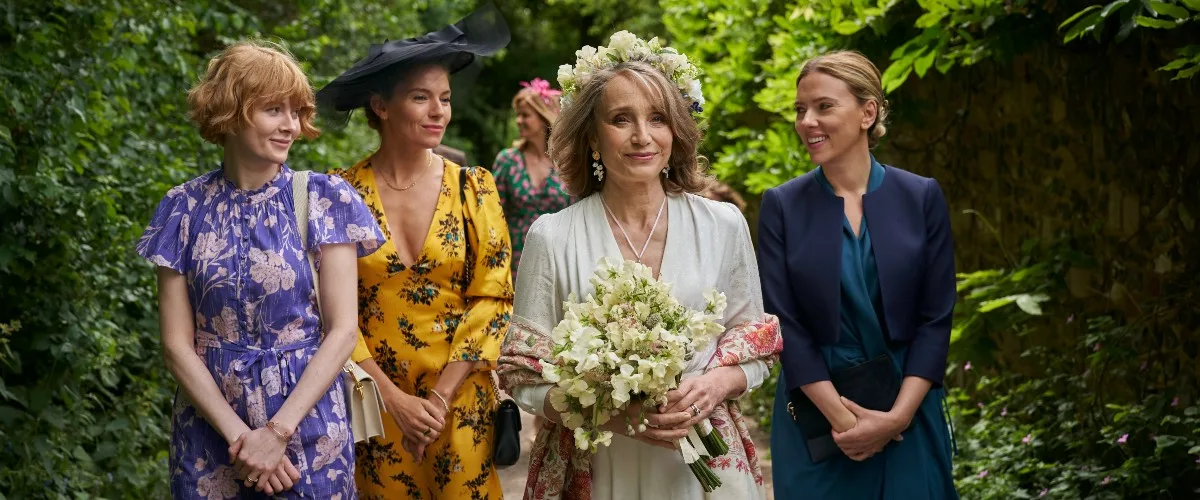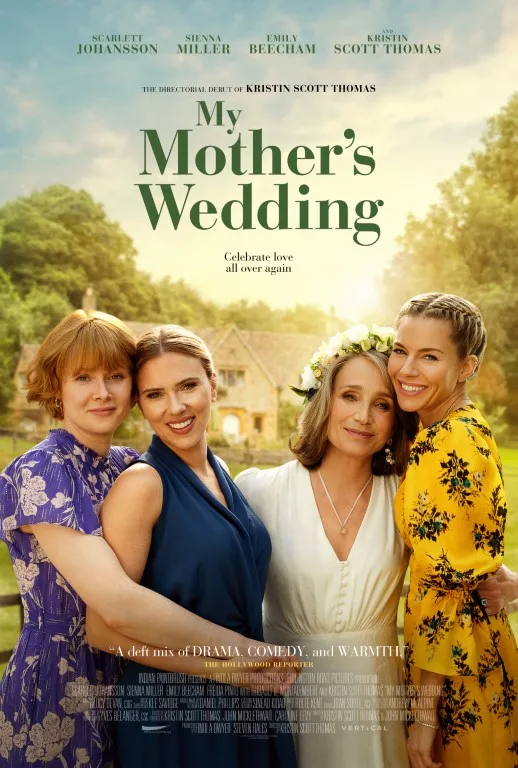No matter how close we are to our siblings, each of us grows up in a different family, observing the same events at various ages, with different temperaments, from different developmental stages. In “My Mother’s Wedding,” three sisters are devoted and supportive, but just one was old enough to remember and miss her father. The middle sister was not, so their stepfather was the only one she ever thought of as “Daddy.” And the third is a half-sister, the daughter of their mother’s second husband, also very young when her father died. That is the basis for just one of the painful confrontations here.
Kristin Scott Thomas co-wrote, directed, and stars as Diana, the titular mother, now getting married for the third time after losing two husbands in military plane crashes. At the end of the movie, there is a tribute to the two fathers Scott Thomas lost by the time she was 12 years old. As co-screenwriter, Scott Thomas gives Diana a chance to tell the adult daughters what perhaps she wishes she had learned earlier, that holding on to a child’s idealized image of the dads they lost was making it impossible for them to make good choices in their adult relationships.
We are introduced to Diana’s three daughters just before the wedding. Katherine (Scarlett Johansson) followed her father into the Navy, where she has just been appointed the first woman to command an aircraft carrier. We see her scrolling through congratulatory emails and ignoring a request, as well as a later phone call from someone named Jack. Victoria (Sienna Miller) is a successful American movie star, about to appear in “Dame of Darkness 4.” On a Kimmel-like talk show, the host tells the audience with maudlin faux sincerity about Victoria’s “Cinderella story of tragedy and resilience,” and the “two great holes in the family.” And then there is Georgina, the half-sister and the youngest (Emily Beecham). She is a nurse, and very aware that she is not as high-profile as her sisters. All three have children they love and troubled relationships with their romantic partners.
The title event is almost an afterthought in the film, lasting just a few minutes. Instead, the film focuses on the emotions, confrontations, and realizations that Diana’s remarriage triggers in the three daughters.
Scott Thomas has paid close attention to her more than 100 appearances in films and television, and she understands the structure of a cinematic story. Each of the daughters finds a way forward. But there are some awkward shifts in tone, particularly around the almost slapstick subplot about a detective hired by Victoria to prove that Georgina’s husband has been unfaithful. It is out of synch with the revelation of the information and its impact. The unnecessary silliness about the groom’s last name and whether Diana will take it undermines what Scott Thomas intends to be—and what should be—a key point about the names we are given and the names we choose. Speaking of which, if the name “Jack” for the character played by Frida Pinto is supposed to be misdirection, it has no point.
Like many first-time screenwriters, Scott Thomas adds distracting details that never reveal character or move the story forward, while overlooking elements we would like to explore, especially the three sisters’ relationships with their children and how they are affected by their mothers’ childhood losses. As a director, she is understandably on surer footing when it comes to eliciting and supporting the performances of her actors, especially Miller and James Fleet (who plays Geoff, the bookish groom). Rom-com fans may be amused to see Fleet and Scott Thomas together again after playing the wealthy siblings in “Four Weddings and a Funeral.”
Who is the “my” in the title? The implication is singular, so possibly Katherine, as she is the only one given flashbacks, impressionistic black and white pencil sketch-style animation with memories of her father. But the story is not told from her perspective, and tries to include all three daughters equally. The film was originally titled “North Star.” Yet, despite a few moments of connection and insight, that is precisely what this story is missing.




















